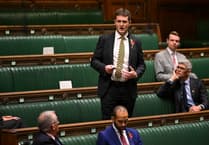Police and crime commissioners are to be scrapped across England and Wales in a bid to save £100m, the government has said.
Announcing the change in the Commons on Thursday, Policing Minister Sarah Jones, said the model had 'failed to live up to expectations' and had 'not delivered what it was set up to achieve'.
Instead, they will be replaced by either an elected mayor or revert to the previous system of having a police committee when the current commissioner terms come to an end in 2028.
Though its stated aim was to make forces more accountable to the areas they serve, the costs of the system and the effectiveness of commissioners has long been criticised.
Sarah Jones said: "Public understanding [of PCCs' role] remains low despite efforts to raise their profiles” adding that less than a quarter of voters turned out to vote for them last year, and two in five people are unaware they even exist.
Turnout for police and crime commissioner elections has been notoriously low since the posts were first created.
Dafydd Llywelyn is the current commissioner for Dyfed-Powys Police, earning £68,202 a year.
According to UK Government ministers, the saving will allow them to invest an extra £20m in front-line policing every year, equating to an extra 320 police constables a year.
First elected in 2012, PCCs oversee non-operational aspects of policing such as managing their local policing budgets and holding the chief constable to account.
Introduced by the Conservative-Lib Dem coalition government, they replaced police authorities.
Although candidates can stand as part of a political party, police and crime commissioners (PCCs) are required to swear an oath of impartiality before taking office.
There are currently 41 commissioners across England and Wales.
Reacting to the announcement, Police Federation of England and Wales National Chair, Tiff Lynch, said: “We welcome this announcement and look forward to helping shape whatever accountability structures replace directly-elected police and crime commissioners. PCCs were an expensive experiment which has failed.
"The tens of millions of pounds they cost should instead be a down-payment for the sort of policing service this country and its police officers deserve – one with enough officers, with experienced police officers who can afford to keep doing the job, and where officers facing immense stress are properly supported when they put their lives and bodies on the line to protect all of us. The forthcoming Police Reform White Paper is a chance for this government to show it is serious about all of this.
“The Police Federation’s Copped Enough campaign is calling for urgent action to recognise the unique demands of policing, a real plan to keep experienced officers on the beat and protecting our communities with proper recognition of the dangers officers face such as better mental health support.”


.png?width=209&height=140&crop=209:145,smart&quality=75)

Comments
This article has no comments yet. Be the first to leave a comment.